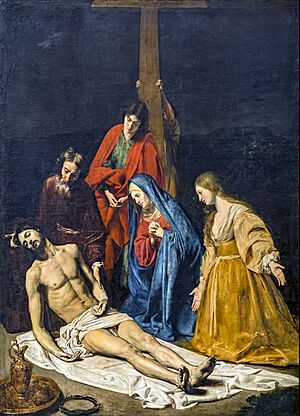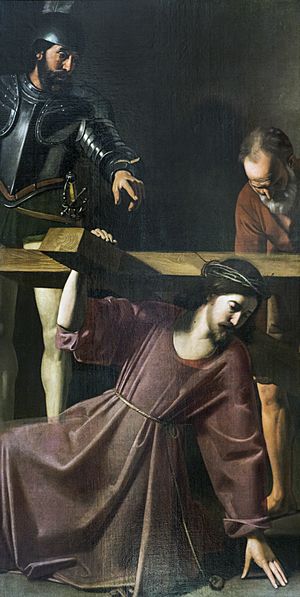Nicolas Tournier facts for kids
Nicolas Tournier (born 12 July 1590 – died before February 1639) was a French painter. He was known for his art during the Baroque period. This was a time when art was very dramatic and full of emotion.
Tournier was born in Montbéliard, France. His father, André Tournier, was also a painter. He was a Protestant from Besançon. Not much is known about Nicolas Tournier's early life. We know he worked in Rome, Italy, between 1619 and 1626.
Tournier's Time in Rome
While in Rome, Nicolas Tournier was greatly influenced by another famous painter, Caravaggio. Caravaggio was known for his strong use of light and shadow. This style is called Chiaroscuro. Tournier's paintings often show this same dramatic lighting.
Some people believe Tournier was a student of Valentin de Boulogne. Valentin de Boulogne was another artist who followed Caravaggio's style. Tournier's art from his time in Rome looks a lot like the works of Bartolomeo Manfredi. Manfredi was also a painter who used Caravaggio's ideas.
Tournier painted many different subjects. He created both everyday scenes and religious artworks. An example of his religious work is The Crucifixion with St. Vincent de Paul. This painting can be seen in The Louvre museum in Paris.
Later Life and Famous Works
After 1626, Tournier moved to southern France. He continued to paint there. He passed away in Toulouse.
One of his most famous paintings is The Carrying of the Cross. He painted this around 1632. It was first placed in a chapel in Toulouse. This chapel belonged to a group called the Company of the Black Penitents.
The Journey of a Painting
During the French Revolution, many artworks were taken by the government. The Carrying of the Cross was one of them. It was moved to a museum. But in 1818, the painting was stolen from the museum.
For almost 200 years, no one knew where the painting was. Then, in 2009, it was found again! It appeared at an art sale in Florence, Italy. In 2011, an art gallery from London bought it at an auction in Paris.
However, the French government said the painting was stolen property. They did not allow it to leave France. Today, this important artwork can be seen at the Musée des Augustins in Toulouse.
See also
 In Spanish: Nicolas Tournier para niños
In Spanish: Nicolas Tournier para niños
 | Emma Amos |
 | Edward Mitchell Bannister |
 | Larry D. Alexander |
 | Ernie Barnes |




